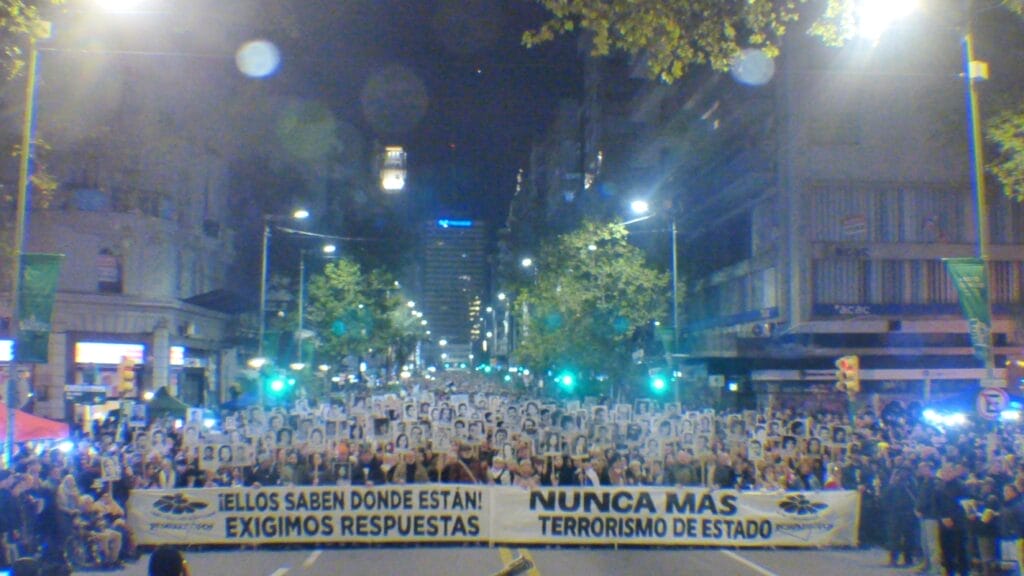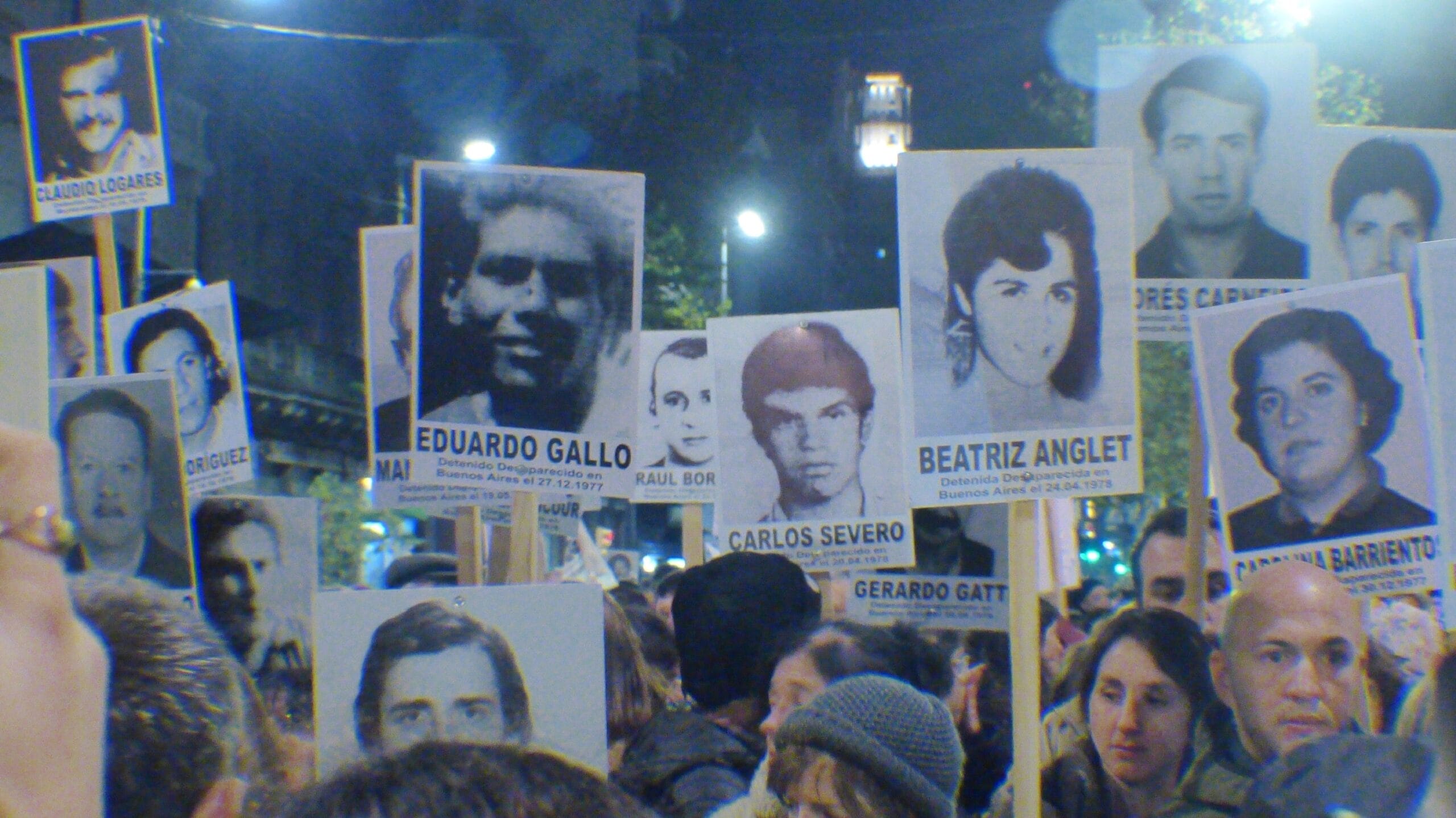Every year on May 20th, thousands gather in Montevideo to demand truth and justice for all the people assassinated, tortured and forcibly disappeared during the brutal Uruguayan civic-military dictatorship that started in 1973 and lasted for twelve years.
May sees the blossom of daisies in Uruguay, some are made of paper and stems of sticks, others are made of ink and cloth that hang from windows and balconies all around the city capital of Montevideo. They are also stenciled and printed on walls and decorating the coats of pedestrians walking throughout the city’s downtown and the whereabouts of the Universidad de la República, located meters away from where today’s demonstration is arranged to start.
The March of Silence demonstration is held every year on May 20th, marking this year its twenty-ninth anniversary, in remembrance of the kidnapping and murder of Hector Gutierrez and Zelmar Michelini, back in 1976 in Buenos Aires, Argentina. It’s important to remark that they belonged to different political parties, Gutierrez, one of the founders of Frente Amplio, a left-wing movement; and Michelini, part of the National Party, a centre-right political party. This distinction shows the way state terrorism worked in Uruguay and the whole continent, largely as a result of the implementation of Operation Condor, a political operation in the 1970s and 80s to overthrow democratically elected governments and replace them with military-led dictatorships as well as other repressive state intelligence operations such as the systematical assassination of political opponents backed by the United States government.
When the demonstration started twenty-nine years ago, organized by the mothers of the detainees, there were very few assistants, mostly friends and families of those who had been taken captive or forcibly disappeared. Nowadays, this demonstration is commemorated in every region of Uruguay and also abroad, in countries all over Latin America and Europe. Remembrance and hope are the main motives for the people who assist in this demonstration, especially for the mothers and relatives who are still looking for their loved ones, that’s why this year’s motto was “They know where they are”. In Uruguay there is still plenty to do for human rights as well as finding justice for the victims of the dictatorship.
The year 1986 marks a turning point for human rights in Uruguay, which is the year when the “Expiration Law”, as they call it, was approved. This law established that crimes committed during and by the dictatorship were not going to be prosecuted unless a judge receives a complaint and decides it has merit to be investigated. If merit is recognized, it is sent to the executive power and is again assessed to prosecute or dismiss. Not only Uruguay’s Supreme Court ruled that this law is unconstitutional, but also the Inter-American Commission on Human Rights established that the law is incompatible with human rights and international law. The law was repealed back in 2011 by the “Interpretative Law”, which mitigates the impunity the last law created, but still, citizens all over the country demand more action from the state in order to finally find justice, reconciliation and the remains of the dictatorship’s missing victims.

This is still palpable every May 20th, in every corner of Uruguay, especially in the Students Martyrs Plaza, named in honour of the students killed during the dictatorship, where the demonstration starts. The march is led by banners demanding the whereabouts of the missing detainees, as well as the guarantee of non-repetition of state terrorism. Behind them, the demonstrators carry placards up high with the names and faces of the disappeared victims, this is done in the most complete and total silence, which is overwhelming. The streets are packed, as well as the sidewalks and there is no room for more people, but they are all in silence, even the footsteps are inaudible. The silence is only interrupted half-way to the end, in front of the Intendancy building, where loudspeakers are placed from where the names of the victims are heard out loud, followed in unison with the cry of every assistant: PRESENTE.
Not only in Uruguay, but in Chile, Argentina, and every country in Latin America, people are still looking for the missing victims of their United States financially sponsored and endorsed state terrorism and dictatorship. As Monica Cardoso and Carlos Liscano so brilliantly show in their book “La Impunidad y su Relato”, the Latin American continent was condemned to the cruelty of their oppressors, inside and outside their country. When Uruguayan President Juan María Bordaberry introduced the military to the state apparatus, the Tupamaros were already decimated, with their members jailed, exiled, dead or forcibly disappeared. He declared that the reason for the military to be part of the government was, in part, to fight them, but they ended up slaughtering people from every political view and way of life. Every Latin American country lived a different process, and their authoritarian regimes were products of their distinct traits. How the people fought for a more democratic and independent country was met with the cruellest response from the regimes, with no regard for the lives and the general well-being of their citizens and countries.
The demonstration held this year, as every year, is not only to embrace and preserve the memory of those who are gone but also a reminder to the executioners and accomplices that people are still looking for their loved ones and demanding justice and will not stop no matter how much time passes. Due to the massive assistance of each year’s demonstration, it is unmistakable that Uruguayan society is engaged in protecting human rights and non-repetition of state terrorism. Daisies are seen all over the country in May, but they thrive in the hearts and souls of those who want and need justice.
By Latin American lawyer Teodoro Manuel, Montevideo.










Eine Antwort
👏🏻👏🏻